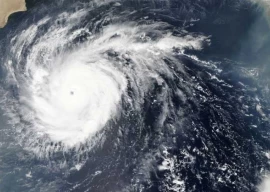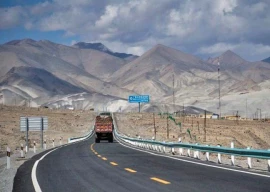
The pursuit of nuclear dominance continues to be a grave concern for international security. The lack of global consensus on critical matters, such as the arms control and global nuclear governance, primarily due to geopolitical competitions, is benefiting India in furthering its strategic ambitions. India, which positions itself as a key country in the region and a potential superpower, is actively engaged in the race for nuclear and technological dominance. In recent years, it has increased its efforts to bolster its nuclear capabilities, with a specific focus on long-range missiles, raising doubts about its declared policy and posing serious threats to world peace. The development of long-range missiles by India, which are capable of reaching far-off targets with nuclear warheads, raises concerns for international security, as these missile ranges, with the capability to target Washington, Ottawa, London, Paris, etc, have undoubtedly further complicated the global security landscape.
India was the first country to nuclearise South Asia and continues to develop nuclear weapons alongside massive conventional buildups. In recent years, India has made a considerable expansion in its missile programme, facilitated by increasing international collaboration, especially enjoying US support and exemptions. India is already capable of targeting the entire territory of Pakistan. India’s short-to medium-range missiles are, by their very ranges, Pakistan-specific. Besides, India is capable of targeting the entire Chinese territory. The Agni-IV missile with 4500km range and Agni-V missile with 5500km range is perceived as a strategic weapon designed with the capability to target the entire Chinese mainland. However, the development of missiles beyond these ranges, such as Agni-VI which is in the developing stage and anticipated to have between 12,000-16000km range, contemplates India’s stride for power projection and nuclear supremacy.
Furthermore, the development of long-range missiles by India signifies the pursuit of prestige on the global stage, and becoming as a superpower nation, emphasising its ability to influence and shape international affairs in terms of strategic significance. For instance, India joins the ranks of nuclear states possessing Intercontinental Ballistic Missile (ICBM) capabilities, aligning with established nuclear powers such as the US, Russia, the UK, France and China. Notably, North Korea, an NPT withdrawn state, has also conducted tests demonstrating its ICBM capabilities. India has already acquired anti-satellite weapons (ASAT) capability and is now advancing its missile programme. India continues to enjoy the impunity of the US and the Western world, which are helping India bolster its military capabilities, granting access to cutting-edge technologies and fissile materials under the exceptional NSG waiver under which India is enhancing its nuclear weapons production capability. Also, the US is ignoring the development in India’s missile programme’s intercontinental ranges, despite its poor nuclear safety and security record, in apparent violation of international norms and the non-proliferation regime’s commitments. Despite receiving support and exemptions from the US and the West, India has yet to prove itself as a reliable US partner.
The growing extremism of Hindutva is evolving into a global issue. Recently, the involvement of the Indian intelligence agency in the killing of a Canadian citizen on Canadian soil and the threatening remarks by an India professor, Kapil Kumar, against Canada on a TV channel shows that, after creating problems for regional countries, India’s Hindutva-driven policies are now threatening global peace. The possession of nuclear-capable long-range ICBMs by such an extremist country poses a significant risk of instability in the region and beyond, as these missiles with the potential to go beyond Pakistan and China and target other parts of the world with nuclear warheads is a great source of concern for the global security. The US and its allies need to recognise that India’s military buildups not only impact strategic stability in South Asia but also entail the risk of nuclear escalation beyond the region.
Published in The Express Tribune, December 19th, 2023.
Like Opinion & Editorial on Facebook, follow @ETOpEd on Twitter to receive all updates on all our daily pieces.











1724910870-0/Untitled-design-(19)1724910870-0-270x192.webp)





1724910885-0/Untitled-design-(23)1724910885-0-270x192.webp)


COMMENTS
Comments are moderated and generally will be posted if they are on-topic and not abusive.
For more information, please see our Comments FAQ